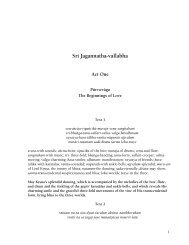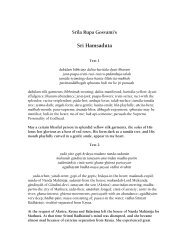Srimad Bhagavatam, Volume 3
Srimad Bhagavatam, Volume 3
Srimad Bhagavatam, Volume 3
Create successful ePaper yourself
Turn your PDF publications into a flip-book with our unique Google optimized e-Paper software.
<strong>Srimad</strong> Bhagawatam, First Canto, <strong>Volume</strong> Three<br />
the context of other great authorities like Asita, Devala, Narada, Vyasa etc. As<br />
such Maharaj Yudhisthir while leaving home for the northern side, he<br />
constantly remembered Lord Sri Krishna within himself following the foot<br />
prints of his forefather as well as great devotees of all times.<br />
Sarvetam anunirjamur bhratarah kritanischayah<br />
Kalina adharam mitrena dristwa pristwah praja bhuvi<br />
Sarve—all his younger brothers, Tam—him, Anunirjamur—get out from<br />
home by following the elder, Bhratarah—brothers, Kritanischavah—<br />
decidedly, Kalina—by the age of Kali, Adharma—principle of irreligiosity,<br />
Mitrena—by the friend, Dristwa—observing, Spristua—having overtaken,<br />
Praja—all citizens, Bhuvi—on the earth.<br />
The younger brothers of Maharaj Yudhisthir observed it also that the<br />
age of Kali had already ushered in all the world over and the citizens of<br />
the kingdom were already affected by the influence of irreligiosity. They,<br />
therefore, decidedly followed the foot prints of their elder brother.<br />
The younger brothers of Maharaj Yudhisthir were already most obedient<br />
followers of the great emperor and they had sufficiently training about the<br />
ultimate goal of life. They therefore decidedly followed their eldest brother in<br />
the matter of rendering devotional service to Lord Sri Krisnna more than<br />
fruitive activities, philosophical speculations or mystic powers. According to<br />
the principles of Sanatan Dharma one must retire from family life after half<br />
the duration of life is finished and must engage himself in the matter of self<br />
realisation. But the question of engaging oneself is not always decided. Some<br />
times such retired men are bewildered how to engage oneself for the last days<br />
of life. Here is a decision by the authorities like the Pandavas that all of them<br />
engaged themselves in the matter of culturing favourably the devotional<br />
service of the Lord Sri Krishna the Supreme Personality of Godhead.<br />
According to Swami Sridhar, Dharma, Artha, Kama and Moksha or fruitive<br />
activities, philosephical speculations or salvation as they are conceived by<br />
several persons, are not the ultimate goal of life. They are more or less<br />
practised by persons who have no decision for the ultimate goal of life. The<br />
ultimate goal of life is already indicated by the Lord Himself in the Bhagwat<br />
Geeta (Bg. 18.64) and the Pandavas were intelligent although to follow it<br />
without any hesitation.<br />
Te sadhukrita sarbartha jnatwa atyantika atmanah<br />
Manasa dharayamasur vaikuntha charanambujam.<br />
Te—all of them, Sadhukrita—having performed everything worth for a saint,<br />
Sarbartha—that which includes everything worthy, Jnatwa—knowing it well,<br />
Atyantika—the ultimate, Atmanah—of the living being, Manasa—within the<br />
mind, Dharayamasur—sustained, Vaikuntha—the Lord of the spiritual sky,<br />
Charanambujam—Lotus feet.<br />
They had all performed all the priciples of religiosities and as a result of<br />
this, rightly they decided that the lotus feeet of Lord Sri Krishna is the<br />
Supreme goal of everytime and therefore they sustained within their<br />
mind uniteruptedly.<br />
In the Bhagwat Geeta the Lord says (Bg. 7.28) that only those who have had<br />
done pious deeds in previous life and thus have become freed from the results<br />
of all impious acts can only concentrate upon the Lotus feet of the Supreme<br />
Lord Sri Krishna. The Pandavas not only in this life but also in their previous<br />
life, they had always performed the supreme pious work and as such they are<br />
ever-free from all the reactions of impious work. It is quite reasonable,<br />
therefore, that they concentrated their mind unto the lotus feet of the Supreme<br />
Lord Sri Krishna According to Sri Viswanath Chaktavarty Dharma, Artha,<br />
Kama and Moksha principles are accepted by persons who are not free from<br />
the results of impious action. Such persons affected with the contaminations<br />
of the above four principles cannot at once accept the lotus feet of the Lord of<br />
the spiritual sky. Vaikuntha world is situated far beyond the material sky. The<br />
material sky is under the management of Durga Devo or material energy of<br />
the Lord but the Vaikuntha world is managed by the Personal energy of the<br />
Lord. The cover-jacket of this book is an explanation of the Vaikuntha world<br />
and the material world.<br />
Tad dhyanot riktaya bhaktya visuddha dhisana pare<br />
Tasmin narayana pade ekanta mataye gatim.<br />
Avapur durvapam te asadbhir visayatmabhih<br />
Vidhuta kalmasa sthanamvirajena atmanaiva hi.<br />
Ted—That, Dhyanot—posidve meditation, Riktaya—being freed from,<br />
Bhaktya—by devotional attitude, Visuddha—purified, Dhisaana—by<br />
intelligence, Pare—unto the transcendence, Tasmin—in that, Narayana—the<br />
Perscnality of Godead Sri Krishna, Pade—unto the lotus feet,<br />
Ekantamataye—of those who are fixeed up in the Supreme Who is one,<br />
Gatim—destination, Avapur—attained, Durvaam—very diffiult to obtain,<br />
Te—by them, Asadbbir—by the materialists, Visayatmabhir—absorbed in the<br />
matter of material needs, Vidhuta—washed off, Kalmasa—material<br />
contaminations, Sthanam—abode, Virajena—withcut any material passion,<br />
Atmanaiva—by the self same body, Hi—certainly.<br />
32<br />
They attained the spiritual sky which is dominated by the Supreme<br />
Narayana Lord Krishna by pure consciousness due to constant<br />
remembrance in devotion. This is attained by them only who are fixed up<br />
in one supreme Lord without deviation. Such abode of the Lord Sri<br />
Krishna, known as Goloka Vrindaban, is not attainable by persons who<br />
are absorbed in material conception of life but the Pandavas being<br />
completely washed off from all material contamination attained the place<br />
in the very self-same body.<br />
According to Srila Jiva Goswami a person freed from the three modes of<br />
material qualities namely goodness, passion and ignorance and situated in<br />
transcendence can reach the highest perfection of life without any change of<br />
the body. Srila Sanatan Coswami also in his Hari-bhakti-vilas says that person<br />
whatever he may be, can attain the perfection of a twice-born Brahmin by<br />
undergoing the spiritual desciplinary actions under the guidance of a bonafide<br />
spiritual master exactly like a chemist who can turn gunmetal into gold by<br />
chemical manupulation. It is therefore, the actual guidance that matters in the<br />
proceass of becoming a Brahmin even without any change of body or to go<br />
back to home Godnead without any change of body. Srila Jiva Goswami<br />
remarks that the word 'His' used in this connection positively affirms this truth<br />
and there is no doubt about this factual position. The Bhagwat GeetEssaysa<br />
also affirms this statement of SrilaJiva Goswami when the Lord says (Bg.<br />
14.26) that any one, who executes the devotional service systematically<br />
without any deviation can attain the perfection of Brahman by surpassing the<br />
contamination of the three modes of meterial nature and when the Brahmanperfection<br />
is still more advanced by the self-same execution of dovotional<br />
service, there is no doubt at all that one can attain the Supreme spiritual planet<br />
Goloka Vrindaban without any change of body as we have already discussed<br />
in the matter of the Lord, returning in His abode without any change of body<br />
(page 931)<br />
Vidura api paritajya prabhase dehamatmanah<br />
Krishna avesena tat chittah pitribhih sakshayam yayou.<br />
Vidura—uncle of Maharaj Yudhisthira, Api—also, Paritajya—after quitting<br />
the body, Prabhase—in the pilgrimage of Prabhasa, Dehamatmanah—his<br />
body, Krishna—the Personality of Godhead, Avesena—being absorbed in that<br />
thought, Tat—his, Chittah—thoughts and actions. Pitribhih—alongwith the<br />
residents of Pitriloka, Sakshayan—his own abode, Yayou—departed.<br />
Vidura, also while he was on pilgrimage, left his body at Pravash; and<br />
because he was full in thought of Lord Krishna he was received by the<br />
denizens of Pitriloka planet where he returned back in his original post.<br />
The difference between the Pandavas and Vidura is that the formers are<br />
eternal associates of the Lord Personality of Godhead, whereas Vidura is one<br />
of the administrative demigods in charge of the Pitriloka planet as Yamaraja.<br />
Every one is afraid of Yamaraja because it is he only who awards<br />
punishments to the miscreants of the material world but those who are<br />
devotees of the Lord have nothing to fear from him. To the devotees he is a<br />
cordial friend but to the non-devotees he is the fear personified. As we have<br />
already discussed about Vidura, it is understood that Yam Raja was cursed by<br />
Manduk Muni to be degraded as Sudra and therefore Vidura was incarnation<br />
of Yamaraj. As eternal servitor of the Lord he displayed his devotinal<br />
activities very ardently and lived a life of a high class pious man so much so<br />
that a materialistic man like Dhritarastra also got salvation by his instruction.<br />
So by his pious activities in devotional service of the Lord he was able to<br />
remember always about the lotus feet of the Lord by which he became washed<br />
off from all contamination of a Sudra born-life and at the end he was again<br />
received by the denizens of pitriloka and posted on his original place. The<br />
demigods are also associates of the Lord withouut any personal touch while<br />
the direct associates of the Lord are in constant personal touch with Him. The<br />
Lord and the personal associates do incarnate in many universes without any<br />
stoppage. The Lord remembers them all while the associates forget due to<br />
their being very minute parts and parcel of the Lord; they are apt to forget<br />
such incidences on account of being infinitesimal. This is corroborated in the<br />
Bhagwat Geeta ( Bg. 4.5 )<br />
Droupadi tada ajnaya patinam anapekshatam<br />
Vasudeve bhagawati hi ekanta matir apa tam.<br />
Droupadi—the wife of the Pandavas, Tada—at that time, Ajnaya—knowing<br />
Lord Krishna fully well, Patinam—of the husbands, Anapekshatam—who did<br />
not care for her, Vasudeva—unto Lord Vasudeva Krishna, Bhagawati—the<br />
Personality of Godhead, Hi—exactly, Ekanta—absolutely, Moti—<br />
concentration, Apa—got, Tam—Him the Lord.<br />
Droupadi also saw it that her husbands without caring for her were<br />
leaving home and she knew well about Lord Vasudeva Krishna the<br />
Personality of Godhead; she and Subhadra also became absorbed in<br />
thoughts of Krishna and got the same result like their husbands.<br />
One has to fly areoplane in the outer space and no body can take care of other<br />
planes. Every one has to take care of his own plane and if there is any danger<br />
no other plane can help in that condition. Similarly at the end of life when one












